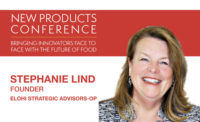Ingredient Innovation, Insights from ABF Ingredients
Prepared Foods talks trends, tastes with Fabienne Saadane-Oaks, CEO, for ABF Ingredients

Fabienne Saadane-Oaks, CEO, ABF Ingredients

Vegan Chicken Tinga Nachos featuring PGP’s PROLIFICIA texturized soy protein and Ohly’s KAV and PROVESTA 512.

Ohly’s Vegan Chicken Tikka Chips made with Ohly’s SAV-R-MEAT and KAT.



Editor’s Note: Prepared Foods used the recent Food Ingredients Europe (FiE) exhibition in Paris as an opportunity to interview with Fabienne Saadane-Oaks, CEO, for ABF Ingredients (ABFI), one of five divisions belonging to the Associated British Foods Group plc, London.
ABFI itself has seven Specialty Ingredients units serving the US and global food, nutrition and consumer products markets. In conjunction with FiE, Prepared Foods was interested in a global perspective on ingredient industry change, challenges and advances. Following is our conversation with Saadane-Oaks.
Prepared Foods: We see that you bring a 33-year perspective to the food ingredients market. In what ways would you say this global sector has most changed during the past decade?
Fabienne Saadane-Oaks: The changes have been numerous and diverse but here are four primary themes. As consumer needs have evolved, it’s become a “mainstream” requirement that natural ingredients provide functionality benefits around health, nutrition and sustainability. With advances in technology, biotech takes on a greater importance and in my mind, this is just beginning. It will continue to open new spaces for innovative ingredients and sustainable solutions.
With increased digitalization, we’ve reached another level regarding traceability across the whole supply chain. Plus, of course, we now have the online direct-to-consumer market, which was very embryonic just a decade ago. In addition, consumers are going online and continuously educating themselves about ingredients. Overall communication needs to develop with that in mind—as opposed to in the past when it was mostly directed at just those in the food industry.
Finally, I’d note that so many emerging small and medium-sized market disruptors are creating new consumer goods categories. This accelerates the entire new product development process. As a result, we’ve also seen a change in the nature and “pace” of partnerships between ingredient suppliers, intermediate formulators and consumer goods producers.
PF: What were ABFI’s biggest challenges during the COVID pandemic? What are you most proud of?
Saadane-Oaks: We quickly adopted new safe, digital ways to work and I’m most proud of how we continued serving customers despite supply chain and labor challenges. We encouraged employees to get vaccinated early. We implemented safety measures and processes in all our facilities and maintained regular communication with all individual team members.
As I mentioned, we adjusted rapidly and efficiently. Our teams worked wonders to secure supply worldwide and we trained our sales and technical support teams on digital communication so they could more effectively interact with customers.
PF: Relatively speaking, we’re only just back to larger exhibitions where you return to face-to-face meetings. How does that help ABFI?
Saadane-Oaks: We all are glad to meet once again with customer and our own teams (within ABFI). Although we accomplished a lot remotely, the human dimension of relationships slowed down during the pandemic—particularly when it comes to innovation and partnership. During the past two years ABFI and its customers also have recruited new talent. It’s also been great to actually meet our new hires as well as new people at our customers’ organizations.
In the end, there’s so much we accomplish during trade shows. There are opportunities to meet new commercial prospects, renew contracts, discover potential new partners and communicate about our new products. It saves time.
PF: In many respects, European food and beverage ingredient guidelines can be more advanced or stringent than those in the United States. How do you view those market differences?
Saadane-Oaks: We see that consumers certainly are different between Europe and the US—and so are their respective regulations. The US is definitely more inclined to welcome innovation and trust its industry. Meanwhile, Europe tends to approach these matters more from the perspective of consumer protection and risk avoidance. Both approaches have pros and cons.
PF: During the past year, ABFI acquired Fytexia Group, a French functional ingredients company in Vendres. How does the business fit and how might it benefit food and beverage processors?
Saadane-Oaks: Fytexia is an excellent addition to our family of businesses and it strengthens us. It’s a strong, science-driven business with a successful track record in the dietary supplements industry. It brings expertise in polyphenols and active ingredients for health and nutrition extracted from botanicals and propolis.
PF: Looking back, what were other key initiatives for your group in 2022?
Saadane-Oaks: There certainly were many. One major push has involved ingredients providing texture and flavor for vegan and meat alternatives. Although many consumers are trying to eat less meat, they still want to enjoy the flavor of meat. Authentic taste and flavor are key when it comes to stimulating repeat purchase of plant-based meat alternatives.
Ohly, our yeast extracts company, offers a range of flavor solutions that deliver that key taste functionality. Chicken is one of the most popular tastes for consumers worldwide so we used FiE to demonstrate OHLY® SAV-R-MEAT PBD. It’s an authentic, powerful yeast-based chicken flavor with high umami impact and a braised chicken flavor profile with dark-meat notes. It helps formulators deliver the perception of “succulence.”
Meanwhile, our PGPI business introduced PROLIFICA®, a range of texturized pea proteins. It mimics the texture of meat and comes in various combinations of shape, size and protein content. This offers food formulators more versatility and creativity when they’re looking to develop plant-based alternatives to traditional meatballs, burger and sausages.
PF: You’ve reference functional ingredients. Has that also been a key focus?
Saadane-Oaks: Yes indeed, our second push involves more functional ingredients such as fructo oligosaccharides or collagen. Our enzymes business, AB Enzymes, is launching ROHALASE® FOS-UP, an enzyme solution for the fast production of short-chain fructo-oligosaccharides (sc-FOS) from sucrose. sc-FOS can be used as a sugar substitute or sweetener or as a prebiotic to support digestive health. Applications include infant formula and pet food as well as food and beverages.
This new products offers multiple benefits. For starters, it delivers approximately 50% fewer kilocalories (kcal) than sugar (2 kcal FOS vs. 4 kcal regular sugar). It works faster than other existing products in the market (one to six hours compared to 20 to 24 hours. It comes in liquid form for easy applications, is very stable up to 50°C and over a broad pH range. It’s also economical with low production costs.
AB Enzymes also supplies COROLASE® enzyme solutions for producing high-quality ingredients such as collagen peptides, gelatine and fish oil. Our COROLASE® 7089 produces collagen peptides with an excellent flavor profile. Our COROLASE® 8000 is a unique, patent-protected enzyme for protein hydrolysis with fast and cost-efficient performance.
In addition, COROLASE® can be used to improve the emulsifying properties of plant proteins (such as pea, soy) and gluten to produce dairy-free sauces, salad dressings, ice cream, sausages and baked goods. This increased solubility also facilitates plant proteins use in beverages with enriched plant protein for sports or clinical nutrition. In dairy alternatives, it helps deliver better taste and mouthfeel.
PF: How has ABFI addressed sustainability?
Saadane-Oaks: We are supporting customers’ carbon-reduction journeys. Ohly’s first carbon-neutral products are the powerful natural yeast ingredient OHLY® FLAV-R-MAX, the classic yeast extract OHLY® FLAV-R-BASE 19, and the yeast-based bionutrient ingredient X-SEED® KAF.
Our flavor modulating OHLY® FLAV-R-MAX delivers a high umami impact that masks off-notes of plant proteins and serves as a salt reduction solution in meat alternatives. The classic yeast extract OHLY® FLAV-R-BASE 19 balances overall flavor with a clean savory note and masks off-notes in vegan dairy applications.
We believe these functional ingredients—along with their carbon-neutral label attributes—are perfect options for innovative, sustainable plant-based finished foods. These natural yeast ingredients are part of our “Plant Protein Taste Toolbox” solutions suitable for vegan diets.
Our yeast-based, bionutrient ingredient X-SEED® KAF provides key nutritional components and helps maximize batch outputs of microbial fermentations. This helps Ohly’s customers in the cultures, probiotics and biopharma segments ultimately produce more with less and meet their carbon reduction targets.
These products represent just the first step on Ohly’s journey to build a portfolio of carbon-neutral products for its customers.
Looking for a reprint of this article?
From high-res PDFs to custom plaques, order your copy today!








